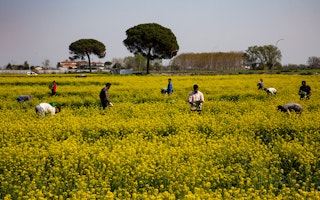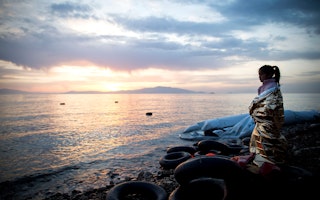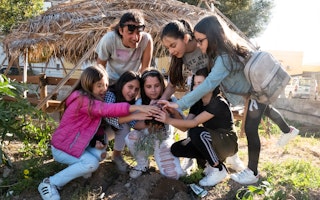In the Mediterranean, Standing Back Is Not an Option
By Giovanna Castagna & Magdalena Majkowska-Tomkin

The youngest passenger was just four days old—a baby with her parents among over 200 survivors travelling on two rubber boats off the coast of Libya, all people seeking protection from war and poverty hoping to make it to Europe.
In the end, on April 1, the boats were intercepted just 22 miles off the Libyan coast by a boat operated by the Spanish NGO Proactiva Open Arms, and transferred to the Sicilian port of Augusta by a chartered fishing trawler. The same day, some 280 more migrants were picked up by a supply ship chartered to Medecins Sans Frontières, the French medical relief organization, and SOS Méditerranée.
Just a few days before, in the same area, 66 people drowned when their overcrowded dinghy overturned.
This year, 602 people had died on the Central Mediterranean crossing to Italy by April 5, according to the International Organization of Migration, up from 355 the year before. Most of the deaths happen 20 to 40 miles from the Libyan coast—with people crowded onto boats that have no hope of making it to Italy.
And yet despite the deaths, a debate has developed in Italy over whether the NGOs involved in search and rescue missions in the Mediterranean are somehow contributing to the problem.
In February, the head of Frontex, the European Union’s frontier and coast guard agency, provoked an outcry when he suggested in an interview that the NGOs were in effect “supporting the business of criminal networks and traffickers in Libya through European vessels picking up migrants ever closer to the Libyan coast.” While two NGO vessels have been operating in these waters over the winter months, coast guard vessels operating under Frontex command have been kept back to patrolling close to the Italian shore—over 100 miles from Libya.
This European response to the increased migration flows is in effect a policy of deterrence. According to this grim argument, if the chances of drowning are high enough, then people will not get into boats. But that is a policy that requires a large number of people to die, and is based on a false assumption: when rescue missions were suspended in 2015, more people came than ever before. And those that are attempting to stop these deaths are becoming a scapegoat for policy failure.
At the Open Society Foundations, we are deeply concerned about the attacks on the NGOs involved in these rescue efforts. While it is important not to encourage smugglers and their ruthless tactics that often result in death and suffering, there is also a moral and a legal imperative under international law not to allow for people to simply perish at sea. Governments are obliged under maritime law to provide Search and Rescue resistance to people in distress, and NGOs are providing this vital function in full cooperation with the Maritime Rescue Coordination Centre in Rome and the Italian Coast Guard.
The Open Society Foundations do not fund search and rescue operations in the Mediterranean. But we do support organizations in Italy and elsewhere in Europe that strive for dignified and effective migration policies, enshrined in the rule of law. Groups we work with, such as ASGI and A Buon Diritto, work to ensure that international, European, and national laws are honored in asylum procedures, that reception conditions are dignified, and that no one is deprived of their liberty without judicial oversight and procedural safeguards.
We also believe that the Italian society has the right to know the facts about migration, and consequently we support those actors that seek to present facts and evidence on how migration is caused, how it affects societies, and which policies bring the best solutions.
For those reasons, we support Carta di Roma, which organizes training for media professionals in the correct use of a fair terminology on immigration and minorities, and the Italian Civil Liberties Coalition’s web platform, called #OpenMigration, which provides data, infographics, commentary, news reporting, and analysis on migration trends, and legal and policy developments.
Europe is still searching for the policy solutions it needs to address the flow of people who are fleeing war and poverty—just as in the 19th and 20th century Italian families once picked up their lives and headed to the United States and Latin America, all in pursuit of a better life. The solutions will only emerge through open, informed debate in Italy and across Europe, driven by our shared humanity.
Until September 2023, Giovanna Castagna was a senior program officer with Open Society–Europe and Central Asia.

Magdalena Majkowska-Tomkin is a division director with Open Society–Europe and Central Asia.


